Will the ocean suffer an epidemic?
Europe’s leading ocean experts launch advice for governments
2024-10-28
(Press-News.org) Written by a team of European experts from the marine sciences, Navigating the Future VI discusses how the biodiversity crisis is being played out in the Ocean. It notes that Ocean species large and small are far less well described than their terrestrial counterparts, making it harder to measure declines and their impacts. This publication provides governments, policymakers and funders with robust, independent scientific advice on future seas and Ocean research. With the COP16 on biodiversity already in full swing in Cali, Colombia, it is timely to reflect further on the need to better understand our Ocean biodiversity.
“Climate change is causing the Ocean to warm up. This forces species to move to find conditions to which they are adapted. But we do not fully understand the implications of these movements. When species move to new habitats, they might spread microorganisms that could cause an epidemic amongst the native species, or conversely, the new arrivals could be susceptible to suffering an epidemic themselves. To avoid such epidemic events, which could lead to local extinctions, we need to understand far more about pathogenic microorganisms and where they live”, says Carlos Pereira Dopazo, lead author of the chapter on Ocean and Biodiversity.
Critical research questions
The NFVI Ocean and Biodiversity chapter presents the ongoing research questions surrounding Ocean biodiversity and its evolution as the Earth changes. It recommends that we focus on addressing the questions of:
What combinations of traditional taxonomic and new genomic methods can we use to speed up species’ identification and make monitoring of biodiversity more comprehensive?
Where do pathogenic marine microorganisms occur, and could they pose a future epidemic risk for marine species?
Where will marine species, such as commercially important fish, move to as the climate changes and the Ocean warms, and how can we avoid human conflicts when species move to new areas?
What emerging human activities will affect marine biodiversity in the future, and how can we mitigate these risks?
How will invasive species affect native marine ecosystems?
Ocean species’ and ecosystem conservation and restoration are costly, but what is the ultimate economic and societal cost of inaction?
About NFVI
NFVI was written by experts from the European Marine Board, an independent non-governmental advisory body that represents more than 10,000 marine scientists across Europe. The publication focuses on the critical role the Ocean plays in the wider Earth system. The working group (operating from October 2022 – October 2024) comprises 33 experts from 16 European countries, covering a wide range of marine natural and social science backgrounds and career levels.
The document can be access at: https://www.marineboard.eu/publications/nfvi
END
[Attachments] See images for this press release:


ELSE PRESS RELEASES FROM THIS DATE:
2024-10-28
The research team of Dr. Byeongjin Park and Dr. Sang Bok Lee from the Composites & Convergence Materials Research Division at the Korea Institute of Materials Science (KIMS), has developed the world's first ultra-thin film composite material capable of absorbing over 99% of electromagnetic waves from various frequency bands (such as 5G/6G, WiFi, and autonomous driving radar) using a single material.
This electromagnetic wave absorption and shielding material is less than 0.5mm thick and is distinguished by its low reflectance ...
2024-10-28
In 2022, U.S. high school students Calcea Johnson and Ne'Kiya Jackson astonished teachers when they discovered a new way to prove Pythagoras’ theorem using trigonometry after entering a competition at their local high school. As a result, both students were awarded keys to the city of New Orleans, and even received personal praise from Michelle Obama.
Today they become published authors of a new peer-reviewed paper detailing their discoveries, published in the journal American Mathematical Monthly.
Pythagoras’ famous 2,000-year-old ...
2024-10-28
UNDER EMBARGO UNTIL 00:01 GMT MONDAY 28 OCTOBER / 20:01 ET SUNDAY 27 OCTOBER 2024
More social species live longer, Oxford study finds
New research published today (28 Oct) from the University of Oxford has revealed that species that are more social live longer and produce offspring for a greater timespan. This is the first study on this topic which spans the animal kingdom, from jellyfish to humans.
What are the benefits and costs of sociality? Social organisms may enjoy benefits such as sharing resources, being better protected from predators, and having support to raise offspring. However, by living in more ...
2024-10-27
Magic is one of the oldest forms of entertainment, and much of its enchantment is said to rely on the audience not knowing how the tricks are done.
However, while magicians swear to keep their secrets forever when they embark on their profession they are happy to share the tricks of their trade in certain circumstances, a new study shows.
Illusionists who took part in major new research thought it was OK to expose their own techniques, but not those invented by others, and also believe it is acceptable to reveal the secrets behind tricks invented by someone who has since died.
They didn’t think it was right to share the workings of a magic trick just to gain public ...
2024-10-27
Like people, birds have fewer friends as they age, but the reasons why are unclear. New research suggests they may just have no drive to.
In humans, it’s often been assumed that older people have fewer friends because they’re pickier about who they spend their time with. There’s also the issue that there are fewer people of their own age around.
But it’s hard to pick apart the various potential causes for humans, so researchers have turned to animals. The team behind the new research, led by Imperial College London, studied an isolated population of sparrows on the island of Lundy, in the Bristol Channel.
By mapping the ...
2024-10-27
Background and Aims
Early determination of prognosis in patients with acute-on-chronic liver failure (ACLF) is crucial for optimizing treatment options and liver allocation. This study aimed to identify risk factors associated with ACLF and to develop new prognostic models that accurately predict patient outcomes.
Methods
We retrospectively selected 1,952 hospitalized patients diagnosed with ACLF between January 2010 and June 2018. This cohort was used to develop new prognostic scores, which were subsequently validated in external groups.
Results
The study included 1,386 ACLF patients and identified six independent ...
2024-10-27
Background and Aims
Hepatocellular carcinoma (HCC) is one of the most fatal malignancies. Epigenetic mechanisms have revealed that noncoding RNAs, such as microRNAs (miRNAs) and circular RNAs (circRNAs), are involved in HCC progression. This study aimed to construct a circRNA-miRNA-mRNA network in HCC and validate one axis within the network.
Methods
HCC-related transcriptome data were obtained from the Gene Expression Omnibus, and HCC-related genes were sourced from GeneCards to identify differentially expressed circRNAs and miRNAs. ...
2024-10-27
“Our finding that enhanced melting of Arctic sea-ice likely resulted in significant cooling in northern Europe in the earth’s past is alarming,” says Mohamed Ezat from the iC3 Polar Research Hub, lead author of the new study. “This reminds us that the planet’s climate is a delicate balance, easily disrupted by changes in temperature and ice cover.”
Ice-free summer conditions are expected to occur in the Arctic Ocean from the year 2050 onwards.
Earlier this ...
2024-10-27
San Diego, CA (October 26, 2024) — For kidney transplant recipients experiencing antibody-mediated rejection, the current standard of care involves removing donor-specific antibodies (DSAs) through plasmapheresis (PLEX)—a procedure that removes antibodies from the plasma portion of the blood. Results from a recent clinical trial reveal that an investigational drug called imlifidase, which cleaves and inactivates the type of antibodies that include DSAs, is more effective than PLEX. The research will be presented at ASN Kidney ...
2024-10-26
San Diego, CA (October 26, 2024) — IgA nephropathy is an autoimmune kidney disease, and complement, a component of the innate immune system, plays a role in the condition’s pathogenesis. Investigators have developed and tested a novel gene therapy that enters kidney cells and enables them to block complement activation. The research will be presented at ASN Kidney Week 2024 October 23– 27.
The gene therapy, called PS-002, uses a modified virus to treat kidney cells called podocytes. Administration of PS-002 in a mouse model of IgA nephropathy reduced signs of kidney dysfunction, lowered complement ...
LAST 30 PRESS RELEASES:
[Press-News.org] Will the ocean suffer an epidemic?
Europe’s leading ocean experts launch advice for governments







